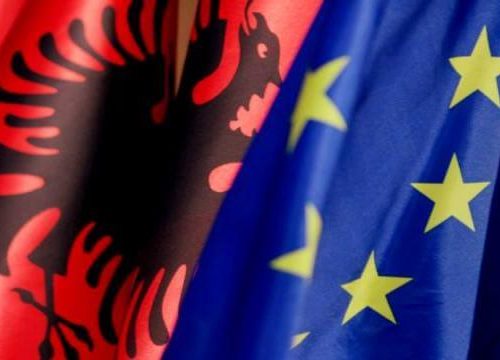The Irony of a Dictatorial Country Like Albania Taking Over the OSCE Chairmanship

The start of 2020 saw Albanian Prime Minister Edi Rama take over the chairmanship of the OSCE, but Rama must address corruption and the political crisis in his home country before he can effectively lead Europe’s largest security organization.
With 57 participating countries across North America, Europe and Asia, the Organization for Security and Co-operation in Europe (OSCE) is the world’s largest regional security organization. The organization works for stability, peace and democracy for more than a billion people through political dialogue about shared values and through practical work that makes a lasting difference.
On January 1, 2020, the OSCE chairmanship was taken over by Albania, the most corrupt and anti-democratic country in Europe. The Chairperson-in-Office is now the Prime Minister of Albania, Edi Rama, who also holds the office of the Minister of Foreign Affairs – aka the dictator of Europe, the Kim Jong-un of the European continent.
The 2020 Chairmanship by Albania is not only ironic but a pure hypocrisy. The OSCE works for stability but Albania has undergone for two years a harsh political crisis. Furthermore, in recent years Albania has risked the destabilization of the entire Balkan region. OSCE stands for peace but Albania was on the brink of a civil conflict a few months ago, and due to the tense political conflict poses a threat at any moment. OSCE stands for democracy, but Albania is the least democratic country in Europe.
All the powers are in the hands of one man, Edi Rama, the new OSCE Chairperson-in-Office. He controls the government, all the municipalities, the courts, the media, even the entire Albanian parliament by buying off the “new” parliamentary opposition. The man and the country who are supposed to work for stability, peace and democracy, are the worst examples of democracy, instead, they represent the best example of dictatorship.
OSCE stands for political dialogue, but Rama, despite his country risking a civil war, has refused dialogue with his political opponents. He has only provoked and mocked the opposition and all the political parties, encouraging and pushing the opposition parties to take extreme measures, such as leaving en bloc their parliamentary mandates, insulting the opponents and using foul language, despising their requests with arrogance.
“Corruption,” noted Rama on taking over the chairmanship, “erodes the foundations of our democracies and has an adverse impact on the prosperity and security of our region, along with transnational threats.” Under Rama’s government, Albania is ranked as the most corrupt country in Europe. Under his governance, Albania is known all over the world as the Colombia of Europe due to the widespread cultivation of drugs and increases in organized crime and drug trafficking. Rama’s government has close ties with the mafia and the oligarchs.
“Intolerance and hate speech are spreading in Europe,” noted Rama. “We must intensify our efforts to counter discrimination and promote human rights and fundamental freedoms.” Rama is the champion of hate speech and a well-known violator of fundamental freedoms. For years he has called the media “garbage.” Recently he passed a set of laws that censure the media and violate freedom of speech. The artists, intellectuals, and students are repulsed with Rama’s communist-like style of governance. A man hungry for power, with a big thirst for absolute authority, as the Chairperson-in-Office of OSCE, Rama is the ultimate example of hypocrisy and the symbol of anti-democratic governance.
The OSCE/ODIHR monitors elections in many countries. The last local elections in Albania demonstrated the worst example of a democratic process, by holding elections with one candidate and no opponents. How then can the OSCE, under an Albanian Chairmanship, work for free and fair elections in other countries? On June 30, 2019, Albania held local elections in which 31 of the 61 municipalities mayoral candidates ran unopposed. The OSCE monitoring mission published its most critical report of the last three decades on Albania. The OSCE / ODIHR preliminary and final report presented a very dark picture of the election process – a voting farce equal only to third world dictatorships, not a country at the heart of Europe aspiring to join the EU.>
Here are some findings of the OSCE/ODIHR report on the June 30, 2019 elections in Albania – the country that ironically holds today the chairmanship of the OSCE and is supposed to lead other nations toward democracy:
- In 31 of the 61 municipalities mayoral candidates ran unopposed;
- The 30 June local elections were held with little regard for the interests of the electorate;
- The opposition decided not to participate, and the government determined to hold the elections without it;
- In the climate of a political standoff and polarisation, voters did not have a meaningful choice between political options;
- The elections took place against a background of a political and institutional crisis;
- The Central Elections Commission interpreted the law inconsistently and in an overly broad manner, reducing legal certainty;
- Voters did not have a comprehensive choice;
- The visibility of campaign events was low, with the exception of Socialist Party rallies at which the Prime Minister was the central speaker;
- Citizens, especially those employed in public administration, came under pressure to demonstrate a political preference;
- With a low number of contestants and many uncontested races, the essential choice presented to citizens was whether to participate or not;
- Journalists operate in uncertain labor conditions and often resort to self-censorship;
- The practice used by the Socialist Party and officials of providing the media with footage from official and campaign events whilst restricting their access to them, limited voters’ ability to obtain objective information;
- The Electoral College stepped in to allocate mandates for all 61 local councils due to CEC’s failure to reach the required qualified majority for the decision;
- On 27 July, the CEC approved the final election results. (27 days after the voting day);
- The political environment ahead of the elections was polarised and antagonistic;
- This antagonism was indicative of the lack of shared responsibility toward the integrity of the electoral process that would transcend party divisions, and, consequently, negatively impacted the right of citizens to take part in government;
- Following the European Commission’s 29 May recommendation to open European Union accession negotiations with Albania, on 18 June the European Council postponed the decision until October 2019 (On October 18, 2019, the European Council refused the accession negotiations for Albania, adding a long list of conditions that must be fulfilled, including free and fair elections);
- Many ODIHR EOM interlocutors expressed lack of trust in all levels of the commissions;
- In several cases the CEC implemented the law inconsistently or in a manner that exhibited bias;
- Citizens, especially those employed in public administration, came under pressure to demonstrate a political preference, which is at odds with Paragraph 7.7 of the 1990 OSCE Copenhagen Document;
- Concerns from citizens that turning out to vote or abstaining would potentially expose them to retribution in their communities;
- Several described direct intimidation and threats of firing or withdrawal of social service benefits;
- The ODIHR EOM observed municipal officials, health services and education staff at large SP-led rallies that in many cities were held immediately after working hours;
- The ODIHR EOM noted widespread perception among interlocutors and the public that employment in the public sector is dependent on political affiliation. Combined, this challenges Paragraph 5.4 of the 1990 OSCE Copenhagen Document;
- Intimidation, harassment and assaults against journalists, while condemned by the authorities, are rarely thoroughly investigated and prosecuted, creating an atmosphere of impunity;
- Many ODIHR EOM interlocutors criticized the long-standing widespread practice of the main political parties and public officials providing media outlets with pre-recorded or live footage from official and campaign events, while such events are closed to the media;
- Some ODIHR EOM interlocutors stressed that, in these elections, Prime Minister Rama’s official and campaign activities were generally both filmed and transmitted exclusively by the Facebook-based channel ERTV, which other outlets could only rebroadcast;
- The practice of restricting media access to public events organised by state officials and political parties limited the voters’ ability to obtain objective information during the campaign;
- It also challenged the fundamental right of the media to receive information and fulfil their watchdog functions with the effect of reducing the accountability of the state officials to the public;
- ODIHR EOM witnessed cases of voter intimidation and violation of the secrecy of the vote in the voting centres and received similar reports from political parties;
- Concerns about overall lack of effectiveness of criminal investigations that contributes to widespread perception of impunity over the past electoral crimes, including for vote-buying and pressure on voters;
- Some voters feared that participation itself would reveal their political preference, especially where SP candidates stood unopposed.
This is Albania’s scandalous electoral product, and a shameful example of democracy in Albania, the country that will now chair the OSCE in 2020. In order to be as reliable as possible and bring dignity to the office that he holds as the Chairperson-in-Office of OSCE, the Albanian Premier Rama must respond to the appeals of Albanian opposition parties and the majority of Albanian people demanding new local and early parliamentary elections be held in a fair, orderly and democratic way. The elections must be held without the vote-buying and blackmail of elections in the past. Otherwise, the taking over of the OSCE Chairmanship is simply a bureaucratic and disgraceful affront to democracy and a big shame for the OSCE itself.








The most ignorant uninformed reporter!!!
What a loser reporter .
Haha, it’s as if the opposition puppet Lulzim Basha wrote this piece. Albania certainly has issues that need to be addressed, but using false hyperboles such as “the Kim Jong Un of Europe” doesn’t really help with anything.
This reporter is either ill informed. Has some kind of personal vendetta with Edi Rama or defiantly been paid by Basha
No other explanation to go on such a rampage